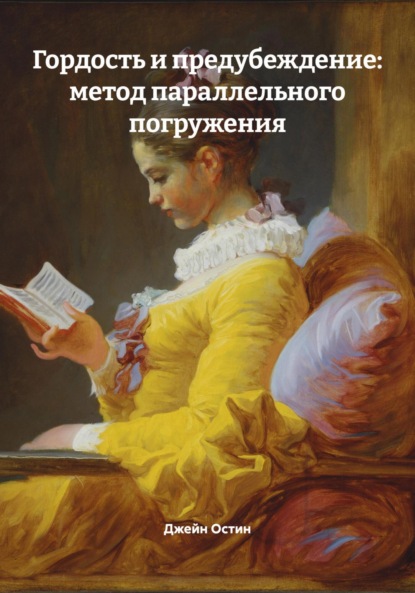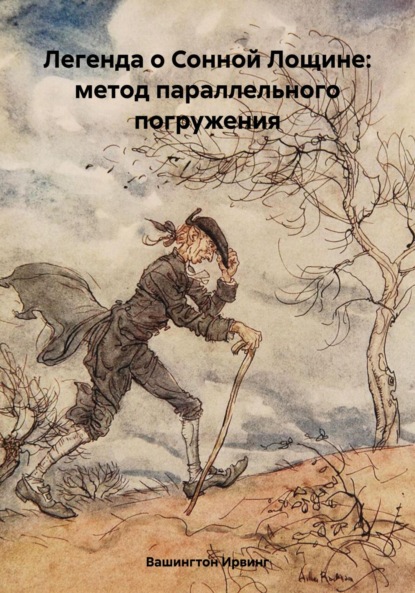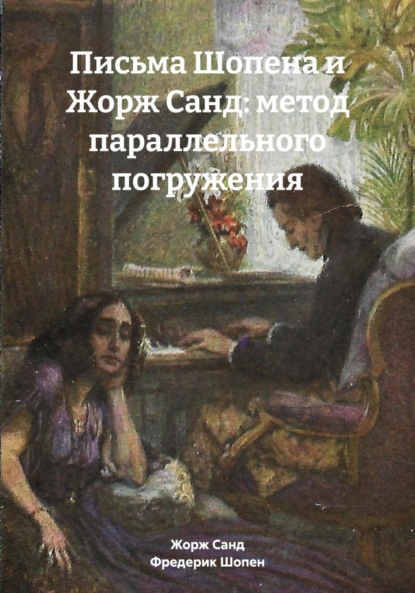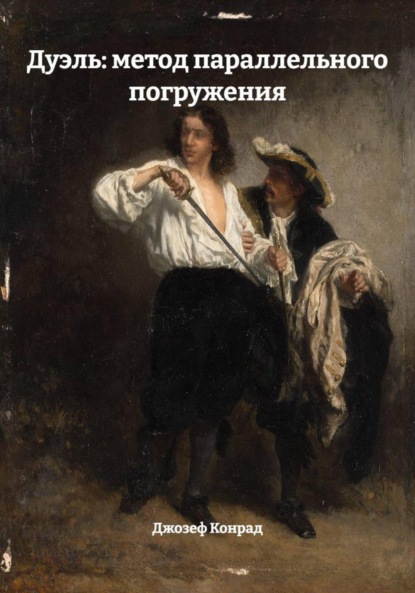Гордость и предубеждение: метод параллельного погружения

- -
- 100%
- +
“I do not believe Mrs. Long will do any such thing. («Я не верю, что миссис Лонг сделает хоть что-то подобное; do any such thing – сделать нечто подобное.) She has two nieces of her own. (У неё есть две собственные племянницы.) She is a selfish, hypocritical woman, and I have no opinion of her.” (Она эгоистичная, лицемерная женщина, и я о ней невысокого мнения; selfish – эгоистичная; hypocritical – лицемерная; have no opinion of – не быть хорошего мнения.)
“I hope Mr. Bingley will like it, Lizzy.”
“We are not in a way to know what Mr. Bingley likes,” said her mother, resentfully, “since we are not to visit.”
“But you forget, mamma,” said Elizabeth, “that we shall meet him at the assemblies, and that Mrs. Long has promised to introduce him.”
“I do not believe Mrs. Long will do any such thing. She has two nieces of her own. She is a selfish, hypocritical woman, and I have no opinion of her.”
“No more have I,” said Mr. Bennet; («У меня тоже нет [мнения о ней], – сказал мистер Беннет; no more have I – и у меня нет; эллипсис: имеется в виду “я тоже не высокого мнения о ней.”) “and I am glad to find that you do not depend on her serving you.” (и я рад узнать, что ты не рассчитываешь на её помощь; glad to find – рад узнать; depend on – полагаться на; serving you – оказание тебе услуги.)
Mrs. Bennet deigned not to make any reply; (Миссис Беннет не соизволила ответить; deigned not to – не соизволила, не удостоила; make any reply – дать какой-либо ответ.) but, unable to contain herself, began scolding one of her daughters. (но, не в силах сдержаться, начала отчитывать одну из дочерей; unable to contain herself – не сумев сдержаться; scolding – ругать, отчитывать.)
“Don’t keep coughing so, Kitty, for heaven’s sake! («Не кашляй так без конца, Китти, ради всего святого!; keep coughing – продолжать кашлять; for heaven’s sake – ради Бога, ради всего святого.) Have a little compassion on my nerves. (Имей хоть немного сочувствия к моим нервам; have compassion – прояви сострадание.) You tear them to pieces.” (Ты разрываешь их на куски; tear to pieces – разрывать в клочья.)
“Kitty has no discretion in her coughs,” said her father; («У Китти нет никакого благоразумия в её кашле, – сказал её отец; discretion – рассудительность, сдержанность.) “she times them ill.” («она выбирает для них самое неподходящее время; to time – приурочивать, выбирать момент; ill – плохо, неудачно.)
“I do not cough for my own amusement,” replied Kitty, fretfully. («Я не кашляю ради собственного удовольствия, – раздражённо ответила Китти; for my own amusement – ради собственного развлечения; fretfully – раздражённо, недовольно.)
“When is your next ball to be, Lizzy?” («Когда будет следующий бал, Лиззи?; next ball – следующий бал; to be – состоится.)
“To-morrow fortnight.” («Через две недели завтра; to-morrow fortnight – досл. “завтра через две недели”, т.е. через 14 дней от завтрашнего дня.)
“Ay, so it is,” cried her mother, («Ах да, точно, – воскликнула её мать; Ay – да, ага; старомодное подтверждение.)
“and Mrs. Long does not come back till the day before; (а миссис Лонг не вернётся до дня накануне; the day before – за день до.) so, it will be impossible for her to introduce him, for she will not know him herself.” (так что она не сможет представить его, ведь она и сама не будет с ним знакома; introduce – представить; will not know him herself – сама его не узнает, не знает лично.)
“No more have I,” said Mr. Bennet; “and I am glad to find that you do not depend on her serving you.”
Mrs. Bennet deigned not to make any reply; but, unable to contain herself, began scolding one of her daughters.
“Don’t keep coughing so, Kitty, for heaven’s sake! Have a little compassion on my nerves. You tear them to pieces.”
“Kitty has no discretion in her coughs,” said her father; “she times them ill.”
“I do not cough for my own amusement,” replied Kitty, fretfully. “When is your next ball to be, Lizzy?”
“To-morrow fortnight.”
“Ay, so it is,” cried her mother, “and Mrs. Long does not come back till the day before; so, it will be impossible for her to introduce him, for she will not know him herself.”
“Then, my dear, you may have the advantage of your friend, and introduce Mr. Bingley to her.” («Тогда, дорогая, ты можешь воспользоваться преимуществом перед своей подругой и сама представить ей мистера Бингли; have the advantage of – иметь преимущество перед; introduce … to – представить кого-то кому-то.)
“Impossible, Mr. Bennet, impossible, when I am not acquainted with him myself; how can you be so teasing?” («Невозможно, мистер Беннет, невозможно – ведь я и сама с ним не знакома! Как ты можешь так дразнить меня?; acquainted with – знакома с; teasing – дразнящий, поддразнивающий.)
“I honour your circumspection. A fortnight’s acquaintance is certainly very little. («Я уважаю твою осмотрительность. Знакомство в две недели, конечно, очень краткое; honour – уважаю; circumspection – осмотрительность; a fortnight’s acquaintance – двухнедельное знакомство.) One cannot know what a man really is by the end of a fortnight. (Невозможно понять, что собой представляет человек, всего за две недели; cannot know – нельзя узнать; by the end of – к концу.) But if we do not venture, somebody else will; (Но если мы не рискнём – кто-то другой это сделает; venture – осмеливаться, рисковать.) and after all, Mrs. Long and her nieces must stand their chance; (и в конце концов миссис Лонг и её племянницы тоже должны иметь свой шанс; stand their chance – попытать счастья, получить шанс.) and, therefore, as she will think it an act of kindness, if you decline the office, I will take it on myself.” (и поэтому, раз она сочтёт это актом доброжелательности, если ты откажешься от этой роли, я возьму её на себя; decline the office – отказаться от обязанности; take it on myself – взять это на себя.)
The girls stared at their father. (Девочки уставились на отца; stared – уставились, посмотрели с удивлением.) Mrs. Bennet said only, “Nonsense, nonsense!” (Миссис Беннет только и сказала: «Глупости, глупости!»; nonsense – чепуха, вздор.)
“Then, my dear, you may have the advantage of your friend, and introduce Mr. Bingley to her.”
“Impossible, Mr. Bennet, impossible, when I am not acquainted with him myself; how can you be so teasing?”
“I honour your circumspection. A fortnight’s acquaintance is certainly very little. One cannot know what a man really is by the end of a fortnight. But if we do not venture, somebody else will; and after all, Mrs. Long and her nieces must stand their chance; and, therefore, as she will think it an act of kindness, if you decline the office, I will take it on myself.”
The girls stared at their father. Mrs. Bennet said only, “Nonsense, nonsense!”
“What can be the meaning of that emphatic exclamation?” cried he. («Что может означать это выразительное восклицание?» – воскликнул он; emphatic – выразительный, подчеркнутый; exclamation – восклицание; cried he – воскликнул он.)
“Do you consider the forms of introduction, and the stress that is laid on them, as nonsense?” («Ты считаешь правила знакомства и то значение, которое им придают, ерундой?; forms of introduction – формы / правила знакомства; stress that is laid on them – акцент, который на них ставится.)
“I cannot quite agree with you there.” («Я не совсем могу с тобой согласиться в этом; cannot quite agree – не могу вполне согласиться.)
“What say you, Mary? («А ты что скажешь, Мэри?; what say you – старомодный оборот: что ты скажешь?) For you are a young lady of deep reflection, I know, and read great books, and make extracts.” (Ты ведь девушка глубокомысленная, я знаю, читаешь великие книги и делаешь выписки; deep reflection – глубокое размышление; great books – великие книги; make extracts – делать выписки, конспекты.)
Mary wished to say something very sensible, but knew not how. (Мэри хотела сказать что-нибудь очень разумное, но не знала, как; sensible – разумное, толковое; knew not – не знала (архаичная форма).)
“While Mary is adjusting her ideas,” he continued, («Пока Мэри приводит свои мысли в порядок, – продолжал он; adjusting her ideas – упорядочивает, формулирует мысли.) “let us return to Mr. Bingley.” («давай вернемся к мистеру Бингли.»)
“I am sick of Mr. Bingley,” cried his wife. («Меня тошнит от мистера Бингли, – воскликнула его жена; I am sick of – мне надоел, я больше не могу слушать о.)
“What can be the meaning of that emphatic exclamation?” cried he. “Do you consider the forms of introduction, and the stress that is laid on them, as nonsense? I cannot quite agree with you there. What say you, Mary? For you are a young lady of deep reflection, I know, and read great books, and make extracts.”
Mary wished to say something very sensible, but knew not how.
“While Mary is adjusting her ideas,” he continued, “let us return to Mr. Bingley.”
“I am sick of Mr. Bingley,” cried his wife.
“I am sorry to hear that; but why did you not tell me so before? («Мне жаль это слышать, но почему ты не сказала мне об этом раньше?; sorry to hear that – жаль слышать; so before – этого раньше.) If I had known as much this morning, I certainly would not have called on him. (Если бы я знал это утром, я бы, конечно, не пошел к нему с визитом; had known – знал бы; called on – нанес визит.) It is very unlucky; but as I have actually paid the visit, we cannot escape the acquaintance now.” (Это очень неудачно, но так как я уже действительно нанес визит, нам теперь не избежать знакомства; unlucky – неудачно; actually – фактически, на самом деле; paid the visit – нанес визит; escape the acquaintance – избежать знакомства.)
The astonishment of the ladies was just what he wished— (Удивление дам было именно тем, чего он добивался; astonishment – изумление, удивление; just what he wished – именно то, чего он хотел.) that of Mrs. Bennet perhaps surpassing the rest; (удивление миссис Беннет, возможно, превосходило остальных; surpassing – превосходя.) though when the first tumult of joy was over, (хотя когда первый порыв радости улегся; tumult – буря, волнение; was over – закончился, улегся.) she began to declare that it was what she had expected all the while. (она начала утверждать, что всё это время ожидала именно этого; declare – заявлять, утверждать; all the while – всё время, с самого начала.)
“How good it was in you, my dear Mr. Bennet! («Как это было благородно с вашей стороны, дорогой мистер Беннет!; how good it was in you – как хорошо ты поступил.) But I knew I should persuade you at last. (Но я знала, что в конце концов уговорю тебя; should persuade – (модальная форма.) I was sure you loved your girls too well to neglect such an acquaintance. (Я была уверена, что ты слишком любишь своих девочек, чтобы пренебречь таким знакомством; too well to – слишком сильно, чтобы; neglect – пренебречь.) Well, how pleased I am! (Ну, как же я рада!; pleased – довольна, счастлива.) And it is such a good joke, too, that you should have gone this morning, and never said a word about it till now.” (И какая это прекрасная шутка, что ты сходил к нему этим утром и не сказал об этом ни слова до сих пор; such a good joke – такая забавная выходка; should have gone – ведь ты сходил; never said a word – не сказал ни слова; till now – до этого момента.)
“I am sorry to hear that; but why did you not tell me so before? If I had known as much this morning, I certainly would not have called on him. It is very unlucky; but as I have actually paid the visit, we cannot escape the acquaintance now.”
The astonishment of the ladies was just what he wished—that of Mrs. Bennet perhaps surpassing the rest; though when the first tumult of joy was over, she began to declare that it was what she had expected all the while.
“How good it was in you, my dear Mr. Bennet! But I knew I should persuade you at last. I was sure you loved your girls too well to neglect such an acquaintance. Well, how pleased I am! And it is such a good joke, too, that you should have gone this morning, and never said a word about it till now.”
“Now, Kitty, you may cough as much as you choose,” said Mr. Bennet; («Теперь, Китти, можешь кашлять сколько душе угодно, – сказал мистер Беннет; as much as you choose – сколько пожелаешь.) and, as he spoke, he left the room, fatigued with the raptures of his wife. (и, сказав это, он вышел из комнаты, утомлённый восторгами своей жены; as he spoke – говоря это; left the room – покинул комнату; fatigued – утомлённый; raptures – восторги.)
“What an excellent father you have, girls,” said she, when the door was shut. («Какой у вас замечательный отец, девочки, – сказала она, когда дверь закрылась; excellent – превосходный.) “I do not know how you will ever make him amends for his kindness; or me either, for that matter. («Не знаю, как вы когда-либо сможете отплатить ему за его доброту – или мне тоже, если уж на то пошло; make amends – компенсировать, отплатить; for that matter – если уж на то пошло.) At our time of life, it is not so pleasant, I can tell you, to be making new acquaintances every day; (В нашем возрасте, могу я вам сказать, не так уж приятно заводить новые знакомства каждый день; at our time of life – в нашем возрасте; pleasant – приятно; to be making – постоянно заводить.) but for your sakes we would do anything. (но ради вас мы бы сделали всё; for your sakes – ради вас.) Lydia, my love, though you are the youngest, I dare say Mr. Bingley will dance with you at the next ball.” («Лидия, моя дорогая, хотя ты и самая младшая, осмелюсь сказать, мистер Бингли будет с тобой танцевать на следующем балу; I dare say – осмелюсь сказать, думаю; will dance with you – станцует с тобой.)
“Now, Kitty, you may cough as much as you choose,” said Mr. Bennet; and, as he spoke, he left the room, fatigued with the raptures of his wife.
“What an excellent father you have, girls,” said she, when the door was shut. “I do not know how you will ever make him amends for his kindness; or me either, for that matter. At our time of life, it is not so pleasant, I can tell you, to be making new acquaintances every day; but for your sakes we would do anything. Lydia, my love, though you are the youngest, I dare say Mr. Bingley will dance with you at the next ball.”
“Oh,” said Lydia, stoutly, “I am not afraid; for though I am the youngest, I’m the tallest.” («О, – уверенно сказала Лидия, – я не боюсь, ведь хотя я и самая младшая, я – самая высокая; stoutly – решительно, уверенно; afraid – боюсь; tallest – самая высокая.)
The rest of the evening was spent in conjecturing how soon he would return Mr. Bennet’s visit, (Оставшаяся часть вечера прошла в догадках, как скоро он нанесёт ответный визит мистеру Беннету; was spent – была проведена; conjecturing – строя догадки; return the visit – нанести ответный визит.) and determining when they should ask him to dinner. (и в обсуждении, когда же пригласить его на обед; determining – решая, обсуждая; should ask him to dinner – пригласить его на обед.)
“Oh,” said Lydia, stoutly, “I am not afraid; for though I am the youngest, I’m the tallest.”
The rest of the evening was spent in conjecturing how soon he would return Mr. Bennet’s visit, and determining when they should ask him to dinner.
CHAPTER III. (ГЛАВА ТРЕТЬЯ)
NOT all that Mrs. Bennet, however, with the assistance of her five daughters, could ask on the subject, (Даже всё, что миссис Беннет могла спросить на эту тему при помощи своих пяти дочерей; not all that … could ask – даже все расспросы; with the assistance of – при помощи; on the subject – по теме, на этот счёт.) was sufficient to draw from her husband any satisfactory description of Mr. Bingley. (не было достаточно, чтобы добиться от её мужа какого-либо внятного описания мистера Бингли; sufficient – достаточно; draw from – выудить у, добиться от; satisfactory description – удовлетворительное описание.) They attacked him in various ways, (Они нападали на него разными способами; in various ways – по-разному.) with barefaced questions, ingenious suppositions, and distant surmises; (с наглыми вопросами, хитроумными предположениями и туманными догадками; barefaced questions – прямолинейные, наглые вопросы; ingenious suppositions – изобретательные, хитрые догадки; distant surmises – отдалённые, неопределённые догадки.) but he eluded the skill of them all; (но он ускользал от ловкости всех их приёмов; eluded – ускользал от; skill – ловкость, мастерство.) and they were at last obliged to accept the second-hand intelligence of their neighbour, Lady Lucas. (и, в конце концов, им пришлось довольствоваться сведениями из вторых рук от своей соседки – леди Лукас; were obliged to accept – были вынуждены принять; second-hand intelligence – информация с чужих слов.) Her report was highly favourable. (Её рассказ был крайне лестным; highly favourable – очень положительный.) Sir William had been delighted with him. (Сэр Уильям был им в восторге; had been delighted – пришёл в восторг.) He was quite young, wonderfully handsome, extremely agreeable, (Он был совсем молод, удивительно хорош собой и чрезвычайно приятен в общении; quite young – довольно молодой; handsome – красивый; agreeable – приятный.) and, to crown the whole, he meant to be at the next assembly with a large party. (и, в довершение всего, он намеревался быть на следующем балу с большой компанией; to crown the whole – в довершение всего; meant to be – собирался быть; a large party – большая группа людей.) Nothing could be more delightful! (Ничто не могло быть более восхитительным!) To be fond of dancing was a certain step towards falling in love; (Любить танцы – это верный шаг к влюблённости; to be fond of – любить, увлекаться; a certain step towards – верный шаг в направлении.) and very lively hopes of Mr. Bingley’s heart were entertained. (и питались самые живые надежды на сердце мистера Бингли; lively hopes – живые, сильные надежды; were entertained – питались, лелеялись.)
CHAPTER III.
NOT all that Mrs. Bennet, however, with the assistance of her five daughters, could ask on the subject, was sufficient to draw from her husband any satisfactory description of Mr. Bingley. They attacked him in various ways, with barefaced questions, ingenious suppositions, and distant surmises; but he eluded the skill of them all; and they were at last obliged to accept the second-hand intelligence of their neighbour, Lady Lucas. Her report was highly favourable. Sir William had been delighted with him. He was quite young, wonderfully handsome, extremely agreeable, and, to crown the whole, he meant to be at the next assembly with a large party. Nothing could be more delightful! To be fond of dancing was a certain step towards falling in love; and very lively hopes of Mr. Bingley’s heart were entertained.
“If I can but see one of my daughters happily settled at Netherfield,” said Mrs. Bennet to her husband, («Если я только увижу одну из своих дочерей счастливо устроенной в Нэзерфилде, – сказала миссис Беннет своему мужу; can but see – только бы увидеть; happily settled – удачно устроенной (в браке); at Netherfield – в Нэзерфилде.) “and all the others equally well married, I shall have nothing to wish for.” (и всех остальных – так же удачно выданных замуж, мне больше нечего будет желать; equally well – столь же удачно; married – выданных замуж; have nothing to wish for – больше не о чём мечтать.)
In a few days Mr. Bingley returned Mr. Bennet’s visit, (Через несколько дней мистер Бингли нанес ответный визит мистеру Беннету; returned the visit – ответил визитом.) and sat about ten minutes with him in his library. (и просидел около десяти минут с ним в его кабинете; library – кабинет, библиотека.) He had entertained hopes of being admitted to a sight of the young ladies, (Он питал надежду, что ему позволят увидеть молодых девушек; entertained hopes – лелеял надежду; admitted to a sight – допущен к просмотру, сможет взглянуть.) of whose beauty he had heard much; (о красоте которых он много слышал; had heard much – много слышал.) but he saw only the father. (но увидел только отца.) The ladies were somewhat more fortunate, (Дамам повезло немного больше; somewhat – немного, слегка; more fortunate – более удачливы.) for they had the advantage of ascertaining, from an upper window, (поскольку у них была возможность выяснить, из окна наверху; had the advantage of – обладали преимуществом; ascertaining – определить, выяснить; an upper window – верхнее окно, на втором этаже.) that he wore a blue coat and rode a black horse. (что он был в синем фраке и ехал верхом на черной лошади; wore – был одет в; rode – ехал верхом.)
“If I can but see one of my daughters happily settled at Netherfield,” said Mrs. Bennet to her husband, “and all the others equally well married, I shall have nothing to wish for.”
In a few days Mr. Bingley returned Mr. Bennet’s visit, and sat about ten minutes with him in his library. He had entertained hopes of being admitted to a sight of the young ladies, of whose beauty he had heard much; but he saw only the father. The ladies were somewhat more fortunate, for they had the advantage of ascertaining, from an upper window, that he wore a blue coat and rode a black horse.
An invitation to dinner was soon afterwards despatched; (Приглашение на обед было вскоре отправлено; invitation to dinner – приглашение на обед; soon afterwards – вскоре после этого; despatched – отправлено, направлено.) and already had Mrs. Bennet planned the courses that were to do credit to her housekeeping, (и миссис Беннет уже распланировала блюда, которые должны были принести похвалу её ведению хозяйства; planned the courses – составила меню; do credit to – делать честь, быть похвалой; housekeeping – домоводство, хозяйственность.) when an answer arrived which deferred it all. (как вдруг пришёл ответ, который всё откладывал; arrived – прибыл; deferred – отложил, перенёс.) Mr. Bingley was obliged to be in town the following day, (Мистеру Бингли необходимо было уехать в город на следующий день; was obliged to – был вынужден; in town – в Лондоне; the following day – на следующий день.) and consequently unable to accept the honour of their invitation, etc. (и, следовательно, не мог удостоить их чести принять приглашение и т. д.; consequently – следовательно; unable to accept – не в состоянии принять; the honour of their invitation – честь их приглашения.) Mrs. Bennet was quite disconcerted. (Миссис Беннет была совершенно обескуражена; quite disconcerted – совершенно расстроена, сбита с толку.) She could not imagine what business he could have in town so soon after his arrival in Hertfordshire; (Она не могла представить, какие у него могли быть дела в Лондоне так скоро после прибытия в Хартфордшир; could not imagine – не могла представить; what business – какие дела; so soon after – так скоро после.) and she began to fear that he might always be flying about from one place to another, (и она начала опасаться, что он всё время будет разъезжать туда-сюда; began to fear – начала бояться; flying about – разъезжать, носиться; from one place to another – с места на место.) and never settled at Netherfield as he ought to be. (и никогда не обоснуется в Нэзерфилде, как ему и следовало бы; settled – поселиться, устроиться; as he ought to be – как он должен бы.)








